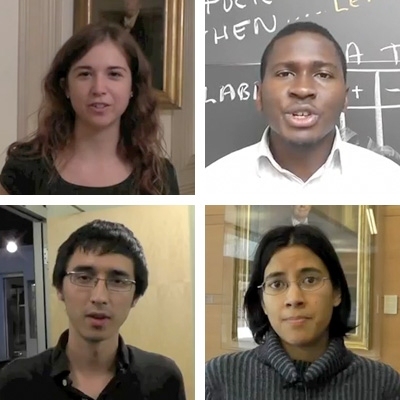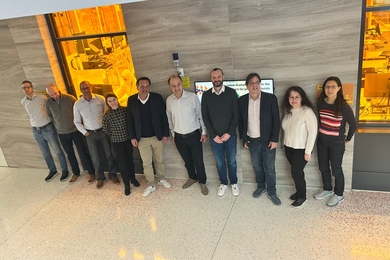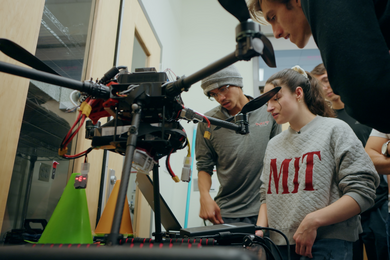As the nation’s political leaders negotiate the future of the federal budget, a student group at MIT, the Science Policy Initiative (SPI), is entering the debate with a petition calling on members of Congress to preserve federal investment in research and development.
The effort, “Stand with Science,” is urging the national research community — and graduate students in particular — to demonstrate to members of Congress and the larger public that federal support for science and engineering plays a vital role in U.S. economic growth. The Stand with Science website features a video and online signature campaign that has garnered nearly 5,000 supporters in just its first week.
“As scientists, we tend to think our science speaks for itself, but it doesn't,” says Johanna Wolfson, SPI president and a doctoral student in the MIT Department of Chemistry. “We have to recognize that and learn to speak for the importance of our research. That's what this letter is about — not only getting scientists and engineers to answer the questions, ‘What has R&D done for the U.S.? What will it do for its future?’ but also to believe that it's their job to answer those questions. Those are the questions that matter to taxpayers and the people writing the checks.”
- Interactive: Sign the petition
Founded in 2007, the Science Policy Initiative is a student-led organization working to foster civic engagement and policy awareness among scientists and engineers at MIT. The MIT graduate students who are leading SPI say that their voices as young researchers add a unique and important perspective to the national conversation.
“We saw that activity in Congress was reaching a head, and decisions were about to be made that would have lasting impact on all aspects of government and the nation,” says Nathaniel Twarog, an MIT doctoral student in brain and cognitive sciences who drafted the letter and video script for SPI. “The letter provides a focal point for the strong — but usually politically quiet — support for science in this country. It's also a chance for graduate students themselves to speak out and realize how the political landscape around them will affect their work.”
The Stand With Science leaders also say they believe the MIT community has a special obligation on this issue. Although cuts in research funding will directly affect grant money at MIT, they say, the Institute’s professors, students and alumni have a more significant reason to support Stand With Science. “MIT is a leader in the science and engineering community. In that role, MIT not only produces some of the world's finest research, but is also a model and a standard-bearer for the advancement and development of science, its application to industry, the arts, agriculture and commerce,” says Michael Henninger, a doctoral student in physics. “This letter is in perfect keeping with the broader directive of that mission, extending beyond our labs and into the life of our nation.”
The deadline for signing the online petition is Monday, Nov. 21, says Samuel Brinton, a master’s student in technology and policy and nuclear engineering who is leading the team’s outreach efforts and directing their social media campaign. The Science Policy Initiative will then submit the petition to the Congressional members of the Joint Select Committee on Deficit Reduction.
Stand With Science is just one of the recent efforts by the Science Policy Initiative. At the end of last month, SPI sent nine student representatives to Washington, D.C., where they spent three days meeting with scientists and policymakers at the Department of Energy, the U.S. Department of Agriculture, the Defense Advanced Research Projects Agency, the National Science Foundation, the National Academy of Sciences, the Office of Management and Budget, and the Department of State.
The students also received a briefing from William Bonvillian, director of MIT’s Washington Office, and visited the American Association for the Advancement of Science. During the visits, students learned about how scientists and engineers shape federal science policy and explore possible career paths in policy.
Other activities range from an Independent Activities Period course and Washington, D.C., visits to a journal club, discussions with policy experts and science communication workshops.






